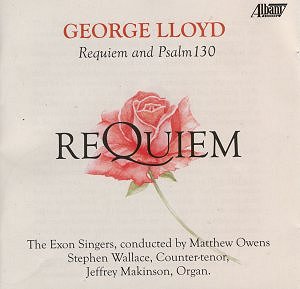Be clear: this is not the grand or even grandiose George
Lloyd of the Pervigilium Veneris or the Litany or the
Mass. These are not works with soloists and a Verdian orchestra.
In fact in the case of the Mass (which takes up all but about
ten minutes of the disc) the organ is the only accompaniment. The Mass
was Lloyd's last work written ‘under sentence of mortality’ and with
full realisation that it could only be completed if the music was pared
down to small chorus and organ.
In the Requiem the Exon Singers sound like a
larger body than the composer's specification led me to expect while
the counter-tenor is too tremulous for my taste though nothing important
is lost. References and potential influences are the Miserere
by Allegri, Britten's Saint Cecilia, Holst's Choral Symphony
and just the occasional glimpse of Orff at one moment (not very
many of those) and Fauré at the next. The Rex tremendae is
very affirmative and the Dies Irae has razory teeth and slashing
talons. The final section of the Requiem is the Lux Aeterna
in which a restful sequence of tumbling phrases for the organ. This
includes the most inventive choral writing which is always melodious
and consonant with the mollifying comfort of the Requiem.
The Psalm 130 (De Profundis clamavi)
was written in 1995 for a cappella choir to a commission by John
D. Owens. Stylistically it is very much of a piece with the Requiem.
The text is in English. It is not printed in the booklet unlike that
of the Requiem. The sopranos achieve the ecstatic 'blue note'
purity you find in Stanford's The Bluebird and in the sung word
harmony in Vaughan Williams' Serenade to Music. There
is more contrast between vigour and reflection in the Psalm than
there is in the Requiem.
The score of the Requiem carries the inscription
'written in memory of Diana, Princess of Wales'. It was completed on
23 January 1998 and Lloyd died on 3 July that year.
This disc will be a compulsory acquisition for any
Lloyd fan but it will also be lovingly appreciated by any admirer of
the vocal music of Fauré, Rutter or Holst. A lovely remembrance
of a warm-hearted composer who wrote against the spirit of the times
and whose music finally met success. His was a dazzling creativity
that reached its apex in symphonies 4-7 and the Pervigilium.
Requiescat in pacem.
Rob Barnett


